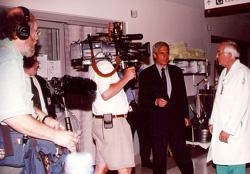
Dr. Roger Yurt, director of the Burn Center, talks to NBC Nightly News correspondent Bob Bazell, about the treatment of patients who suffered serious burns at the World Trade Center disaster.
During the World Trade Center emergency, Weill Cornell faculty participated in many interviews and responded to inquiries from the news media who were covering the many medical dimensions of the disaster—including burn and trauma care, wound healing, skin grafting, emergency medicine, post-traumatic stress, grief counseling, and the overall efforts of the Medical Center in responding to the emergency.
Dr. Greg Bauer (surgery) was interviewed by Associated Press TV about the work of the Burn Center during the crisis.
Dr. Palmer Bessey (surgery), associate director of the Burn Center, was interviewed about the work of the unit by the Daily News, Newsday, WCBS-TV and Italian press.
Dr. Emilio Carrillo (medicine) was interviewed by Argentine TV about Weill Cornell's response to the disaster.
Dr. Marylene Cloitre (psychology in psychiatry) was interviewed about the mental and emotional ramifications of the disaster by Time magazine and the Daily News.
Dr. JoAnn DiFede (psychology in psychiatry) discussed emotional trauma and post-traumatic stress disorder with several media outlets: NBC Nightly News, Time magazine, Crain's New York Business, CBS Healthwatch.com, National Public Radio, and CBC (Canadian Broadcasting Company) News World Canada.
Dr. Neal Flomenbaum (emergency medicine) discussed emergency medicine with the Houston Chronicle. Dr. Flomenbaum also appeared on WPIX, an NBC affiliate in Texas.
Dr. Antonio Gotto, dean of the Medical College and professor of medicine, was profiled by the Houston Chronicle on Weill Cornell's response to the disaster.
Dr. Flemming Graae (psychiatry) discussed crisis counseling in The New York Times.
Dr. Alan Manevitz (psychiatry), who was at the disaster scene helping rescue workers and victims, commented on the emotional trauma and stress associated with the disaster for ABC's Good Morning America, WABC-TV, WNBC-TV, WB-11, Japanese TV, WCBS Radio, the Daily News and the New York Post.
Dr. Gail Saltz (psychiatry) discussed coping with the tragedy on the NBC Today Show.
Dr. Howard Sander (neurology), who was at the disaster scene in the first hours after the destruction of the World Trade Center towers, was interviewed by Reuters about his rescue efforts.
Dr. Gillian Shepherd (medicine) commented on the air quality at the disaster site in a story in the New York Post.
Dr. David Silbersweig (psychiatry and neurology and neuroscience) showed images of the brain affected by post-traumatic stress disorder on NBC Nightly News.
Dr. Lisa Staiano-Coico (surgery) discussed wound healing and skin grafting with Newsday.
Dr. Philip Wilner (psychiatry) discussed post-traumatic stress disorder in Time magazine and the Daily News.
Dr. Roger Yurt (surgery), director of the Burn Center, described the work of the unit for PBS' NewsHour with Jim Lehrer, WNBC-TV, WABC-TV, The New York Times, Time magazine, the Houston Cronicle and the British Medical Journal. He also discussed advances in wound healing and skin grafting in Newsday.

